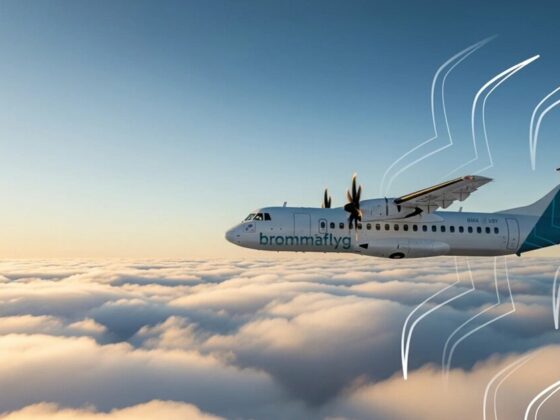
It’s been a bumpy ride for the aviation industry this year, with strikes, IT failures, and severe weather testing the resilience of airlines globally. Despite exceeding pre-pandemic passenger numbers, the industry faces mounting reputational risks in an era where social media can amplify a single misstep in minutes. To navigate these challenges, airlines must embrace a proactive, data-driven approach to reputation management.
Analysis reveals that factors such as airline rankings, passenger experiences, and financial performance heavily influence consumer choices. A fragmented approach to data is no longer sufficient. By integrating insights from media, social platforms, and audience analysis, airlines can craft targeted responses that not only reduce reputational fallout but also foster deeper consumer trust.
In leveraging data effectively, airlines have the opportunity to convert moments of reputational turbulence into lasting customer loyalty and competitive advantage.
Gaining control after a crisis
Over the past twelve months, the airline sector has been placed firmly under the global spotlight. From IT meltdowns during the summer, to severe flooding in Dubai and French strikes grounding flights, the industry’s standing has been repeatedly challenged. On top of this, workforce shortfalls at Cathay Pacific, a turbulence incident at Singapore Airlines and a series of complications at Boeing collectively underscore how difficult it is to maintain a strong corporate reputation in today’s world.
Airlines now operate amid heightened pressure as they navigate cutting-edge technologies, operational hurdles, and escalating congestion. Social media has radically transformed how both praise and criticism circulate. Since travel often provokes strong emotions, passengers quickly vent their frustrations online when problems arise. This rapid flow of information makes it harder for airlines to control the narrative—yet it also presents an invaluable chance for immediate scrutiny and swift corrective action.
The way carriers address problems can have lasting repercussions for customer retention and engagement. A turbulence incident on a Singapore Airlines flight illustrated that maintaining neutral or even positive coverage after a crisis is possible, provided the issue is handled adeptly and the airline remains blameless. However, Cathay Pacific did not enjoy the same benefit when its cancellations and delays—due to staff shortages—were interpreted as poor planning and inadequate investment, resulting in less sympathetic public sentiment.
Grasping passenger priorities
So, what makes the difference for customers? According to the Airlines Reputation Report, products and services were the biggest driver of traditional and social media and the most influential factor in people’s opinions of a company’s reputation. Additionally, research carried out by CMAC Group found that 46% of UK travellers stated that flight delays or cancellations, together with the airline’s service standards, would deter them from choosing that carrier again in the future.
Social media discussions in these spheres serve as a crucial source of immediate feedback for airlines. Take X, formerly known as Twitter, as an example—it records thousands of mentions of airline brands each day. While this data can signal shifts in public sentiment, it must be carefully assessed to yield practical insights. Continual monitoring and analysis, supported by the right technology and expert evaluation, enable airlines to identify evolving customer expectations and pinpoint genuine areas of dissatisfaction.
Our recommended approach empowers airlines to detect changes in public sentiment by combining insights from news reports, social media analysis and audience research. This methodology not only offers a snapshot of current opinion but also provides actionable guidance, helping communications teams refine their strategies before issues intensify. By integrating and contextualising a range of data sources, airlines move beyond simply reacting to chatter, instead proactively managing their reputation.
Building reputation with unified data approaches
The power of data-driven insights lies in their ability to guide proactive strategies. By monitoring brand mentions across social platforms, news outlets, and customer feedback sites, airlines can merge these inputs into comprehensive, real-time reports that illuminate evolving public sentiment. This holistic view enables communications teams to stay ahead of potential reputational threats and ensure that their messages continue to strike a chord with key audiences.
Although thorough planning and preparation are crucial, certain challenges—such as weather-related disruptions—cannot be avoided. For PR and communications teams, being proactive, adaptable, and open is essential to delivering swift and suitable responses. There is no universal formula. Real-time crisis analysis, supported by a diverse range of data, helps brands address stakeholder concerns more effectively. It’s not merely about amassing data; it’s about interpreting it so that airlines can foresee problems and communicate more efficiently.
With the advent of social media and the proliferation of misinformation, crisis communication must now look beyond simply engaging the media and customers. Brands must also factor in authorities, various audiences, investors, and their own staff when developing narratives. For instance, if social media chatter intensifies around a delayed flight or a new policy, this approach enables airlines to understand both the broader sentiment and the specific issues being raised. Armed with these insights, communications teams can swiftly deliver tailored messages and adjust their strategies to minimise reputational damage.
Evolving communications for today’s challenges
With this integrated analysis of data drawn from social media posts, online articles and audience insights, airlines can move beyond a defensive posture and adopt a more forward-looking approach to reputation management. Instead of waiting for grievances to appear in the press and be carried further online, they can anticipate challenges and prove to passengers that their concerns are being heard.
By analysing and assessing the impact across multiple data sources, airlines gain the capacity to shape their own narrative in a crowded, fiercely competitive marketplace. Careful research helps them detect emerging trends, tackle persistent problems, and assess how effectively their communications are landing. By identifying patterns and addressing frequent issues, airlines can showcase their dedication to ongoing improvements—ultimately cultivating a brand that passengers trust and recommend.
Proactive reputation management for lasting loyalty
Airlines today face mounting pressure to go beyond crisis response and establish relationships built on trust and loyalty. A data-driven approach allows them to identify customer concerns in real time, act on them swiftly, and use feedback to shape better experiences for passengers.
By integrating insights from social media, online and print coverage analysis and audience data, airlines can craft communications that address concerns meaningfully, preventing minor setbacks from turning into major reputational issues. Proactive engagement not only helps mitigate risks but also demonstrates a brand’s commitment to listening and improving.
In a highly competitive and visible industry, data-driven reputation management equips airlines to stay resilient, relevant, and connected with customers, ensuring a foundation of trust that supports long-term success.






